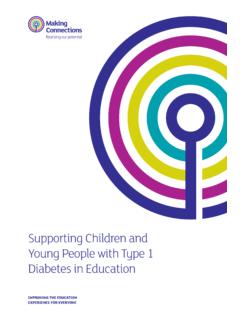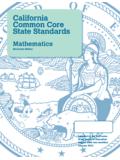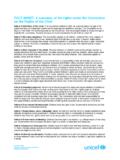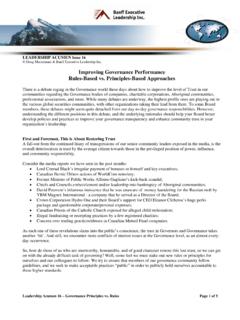Transcription of OUTCOMES-BASED EDUCATION: PRINCIPLES AND …
1 1 OUTCOMES-BASED EDUCATION: PRINCIPLES AND POSSIBILITIES Dr Roy KillenFaculty of education , University of Newcastle, AustraliaThis paper explores some of the basic PRINCIPLES of OUTCOMES-BASED education and relates themto the Australian school and vocational education context. It is intended to help teachers2understand how they can translate the theory and philosophy of OBE into practical action in theirinstructional planning, teaching and assessment of student3 learning. The paper recognises thatOBE has critics as well as advocates, and responds briefly to some of the concerns that arecommonly expressed about OBE.
2 In several respects, the paper is deliberately provocative,challenging teachers to question their current teaching practices and to find ways in which someof the philosophies of OUTCOMES-BASED education can be incorporated into their teaching. Thepaper does not attempt to be a complete treatise on OBE. Rather, it introduces some ideas thatare central to OBE and suggests ways in which these ideas could be explored in greater quality of an educational system can be judged from at least three perspectives: the inputs tothe system, what happens within the system, and the outputs from the system.
3 Those who areinterested in inputs will focus their attention primarily on finances, resources, infrastructure, etc.,and may use economic rationalism as the basis for their judgements about the quality or value ofthe system. Those interested in what happens within the system will focus their attentionprimarily on the processes used to organise, control and deliver education and training. Thoseinterested in outcomes will focus their attention primarily on the products or results of can be argued that all aspects of education are important and that quality should not be judgedfrom any narrow perspective.
4 However, in recent years there have been increasing calls inWestern society for greater attention to be paid to the outcomes of education so that the return oninvestments in education (particularly public education ) could be evaluated. These increasingcalls for accountability were one reason for the rapid spread of various forms of outcomes-basededucation in countries such as the United States and the United Kingdom during the 1980s and1990s. In Australia also, the concept of educational accountability was one of the drivingmotives behind the introduction of OBE.
5 Here, the stimulus for OUTCOMES-BASED education camefrom several sources: political, economic and educational. In particular, the development ofNational Profiles (descriptions of the progression of learning typically achieved by studentsduring the compulsory years of schooling) reflected a new political will in the States towardscollaboration and rationalisation (Eltis, 1995, ). These developments were closely relatedto the Federal Government's drive for national economic efficiency, which itself reflected aworldwide emphasis on accountability (including calls for schools to produce measurable outputs commensurate with the public moneys invested in them).
6 There are two basic types of outcomes from any educational system. The first type includesperformance indicators such as test results, completion rates, post-course employment rates, second type of outcome is less tangible and is usually expressed in terms of what studentsknow, are able to do, or are like as a result of their education . It is this second type of outcome 1 This paper is copyright. It contains sections of text that have been used elsewhere by the author in published andunpublished materials.
7 It is a working document that will continue to be modified. This version was produced on25th July, 2000 and should be cited as: Killen, R. (2000). OUTCOMES-BASED education : PRINCIPLES and manuscript, University of Newcastle, Faculty of For convenience, the generic term "teacher" is used in this paper to describe the person responsible for guiding theinstructional process. The techniques described here may be applied in various teaching contexts, such as schools,universities, or training In this paper the terms student and learner are used is normally implied when OUTCOMES-BASED education (OBE) is being discussed, and the termis used in that way throughout this BASIC PRINCIPLES OF OBEOBE, like most concepts in education , has been interpreted in many different ways.
8 The term isoften used quite inappropriately as a label for a great variety of educational practices that pay littlemore than lip-service to the fundamental PRINCIPLES of OBE. To clarify some of this confusion, youmust start by realising that OBE can be viewed in three different ways as a theory of education , oras a systemic structure for education , or as classroom practice. Ultimately, we need to align thesystemic structure and the classroom practice with the theory if we are to have genuine OUTCOMES-BASED education . We can think of OBE as a theory (or philosophy) of education in the sense that itembodies and expresses a certain set of beliefs and assumptions about learning, teaching and thesystemic structures within which these activities take place.
9 The most detailed articulation of thetheory underpinning OBE is given in Spady (1994, 1998). While Spady is not the only person tohave made a significant contribution to OBE, he is regarded by many as the world authority onOBE and it is evident that his ideas have had considerable influence on the approach to OBE thathas been taken in Spady s words: Outcome- based education means clearly focusing and organizing everything inan educational system around what is essential for all students to be able to do successfully at theend of their learning experiences.
10 This means starting with a clear picture of what is important forstudents to be able to do, then organizing the curriculum, instruction, and assessment to make surethis learning ultimately happens (Spady, 1994:1). Such an approach presupposes that someone candetermine what things are essential for all students to be able to do , and that it is possible toachieve these things through an appropriate organisation of the education system and throughappropriate classroom main idea behind Spady s definition is that OBE is an approach to planning, delivering andevaluating instruction that requires administrators.







